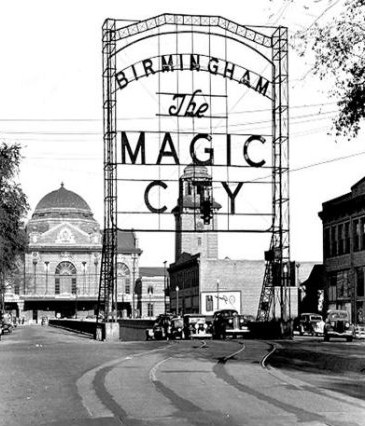Introduction
Birmingham, Alabama was the scene of perhaps the most significant campaign of the Civil Rights Movement, not least because it catapulted Martin Luther King Jr. to national prominence. King and his Southern Christian Leadership Conference (SCLC) had been invited to Birmingham, one of the nation’s most segregated cities, by the Reverend Fred Shuttlesworth, whose own efforts to negotiate desegregation with the city’s business leaders and government officials had failed. In the spring of 1963, King and the SCLC carefully orchestrated a program of nonviolent demonstrations and sit-ins, targeting downtown businesses and white churches, hoping to gain national public attention and sympathy, and eventually federal intervention, should their direct action produce a violent counter-reaction from the authorities—as indeed it did. On April 10, 1963, the city issued an injunction barring the demonstrations, which King and the demonstrators ignored: nonviolent resistance now included direct civil disobedience. On April 12, King was among the 50 people arrested and jailed for defying the city’s injunction.
The next day, a group of eight moderate white Alabama clergymen published this open letter, criticizing the confrontational demonstrations (and King, though not by name) and calling instead for negotiations (a new, less combative mayor was just taking office). (The group had earlier that year published “An Appeal for Law and Order and Common Sense,” which urged the use of the courts to correct bad laws and called for obedience to the laws until they are legally overturned.) The next day, King answered “A Call for Unity” with his “Letter from Birmingham Jail.”
Why do the clergymen regard the demonstrations as “unwise and untimely”? Why do they object to the involvement of “outsiders” (a clear reference to King and the SCLC) in the affairs of their city? What do they mean by calling the demonstrations “extreme measures”? What are they worried about for their city? What do they mean by “actions as incite to hatred and violence, however technically peaceful those actions may be”? Granting the clergymen the benefit of any doubts regarding the decency of their motives, and imagining yourself as a contemporary reader of their “call to unity,” what can you say in favor of their position? Before reading King’s critical response to the clergyman, try formulating your own rebuttal.
We the undersigned clergymen are among those who, in January, issued “An Appeal for Law and Order and Common Sense,” in dealing with racial problems in Alabama. We expressed understanding that honest convictions in racial matters could properly be pursued in the courts, but urged that decisions of those courts should in the meantime be peacefully obeyed.
Since that time there has been some evidence of increased forbearance and a willingness to face facts. Responsible citizens have undertaken to work on various problems which cause racial friction and unrest. In Birmingham, recent public events have given indication that we all have opportunity for a new constructive and realistic approach to racial problems.
However, we are now confronted by a series of demonstrations by some of our Negro citizens, directed and led in part by outsiders. We recognize the natural impatience of people who feel that their hopes are slow in being realized. But we are convinced that these demonstrations are unwise and untimely.
We agree rather with certain local Negro leadership which has called for honest and open negotiation of racial issues in our area. And we believe this kind of facing of issues can best be accomplished by citizens of our own metropolitan area, white and Negro, meeting with their knowledge and experiences of the local situation. All of us need to face that responsibility and find proper channels for its accomplishment.
Just as we formerly pointed out that “hatred and violence have no sanction in our religious and political traditions,” we also point out that such actions as incite to hatred and violence, however technically peaceful those actions may be, have not contributed to the resolution of our local problems. We do not believe that these days of new hope are days when extreme measures are justified in Birmingham.
We commend the community as a whole, and the local news media and law enforcement officials in particular, on the calm manner in which these demonstrations have been handled. We urge the public to continue to show restraint should the demonstrations continue, and the law enforcement officials to remain calm and continue to protect our city from violence.
We further strongly urge our own Negro community to withdraw support from these demonstrations, and to unite locally in working peacefully for a better Birmingham. When rights are consistently denied, a cause should be pressed in the courts and in negotiations among local leaders, and not in the streets. We appeal to both our white and Negro citizenry to observe the principles of law and order and common sense.
Signed by:
C. C. J. CARPENTER, D.D., LL.D., Bishop of Alabama.
JOSEPH A. DURICK, D.D., Auxiliary Bishop, Diocese of Mobile-Birmingham
Rabbi MILTON L. GRAFMAN, Temple Emanu-El, Birmingham, Alabama
Bishop PAUL HARDIN, Bishop of the Alabama-West Florida Conference of the Methodist Church
Bishop NOLAN B. HARMON, Bishop of the North Alabama Conference of the Methodist Church
GEORGE M. MURRAY, D.D., LL.D., Bishop Coadjutor, Episcopal Diocese of Alabama
EDWARD V. RAMAGE, Moderator, Synod of the Alabama Presbyterian Church in the United States
EARL STALLINGS, Pastors, First Baptist Church, Birmingham, Alabama
Return to The Meaning of Martin Luther King Jr. Day.





Post a Comment